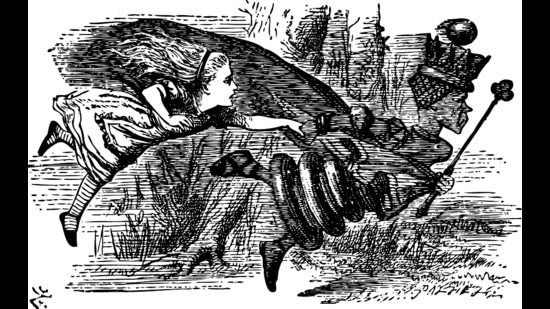Staying one step ahead of tomorrow: Life Hacks by Charles Assisi
We’re wired for paranoia. But if you want to combat your fear of a changing world, reskill, reinvent, and take a cue from the Red Queen.
The idea that technology could take on most of our jobs has always felt paranoid to me. We are, however, wired for paranoia. The evolutionary biologist Leigh Van Valen called it the Red Queen Hypothesis — the idea that you had better be running faster than you are now if you want to stay ahead (we’ll get to why he called it that in a bit).

In a paper published in 1973, Van Valen proposed that — because living beings exist amid the threat of extinction — every living species is constantly striving to adapt, evolve and proliferate.
We see this perhaps most clearly in the worlds of business and finance — shortcuts used to get ahead (even if only in the short-term); cunning deployed to annihilate the opposition; influence, wealth and even sexuality used as weapons to advance ambitions. We have seen also — across sectors and ways of living — that battles to survive get uglier and more intense when resources are scarce.
Over time, the Red Queen Hypothesis has been used by researchers across disciplines. Those in business use it to explain why companies sometimes compete in a self-defeating manner. Biologists have used it to predict the outbreaks of epidemics.
The downside of being wired to be paranoid is that we can lose sight of all that we have gained. That is why most of us fail to appreciate that we live in an era of unprecedented abundance, in which there is so much to be grateful for.
To place that in perspective, imagine a world minus the technologies at our disposal such as the social media that we routinely berate. How much harder would the pandemic be to live through if we did not have these seamless ways to connect with each other and the world at large?
Smallpox killed 300 million people between 1900 and 1976. The “social distancing” practised then was all about ostracising those who contracted the disease. Policymakers hadn’t thought up options such as lockdowns — largely because there wasn’t the technology we have today, which allows large chunks of the population to work and shop and be entertained from within their homes.
That is why sweeping assertions such as “Social media is evil” are so absurd. I must concede I fell for that assertion too, a while ago, and had weaned myself off social media completely. But I have realised that shutting myself off reveals a poverty of imagination, and little understanding of history.
When the printing press was still relatively new — barely 60 years after it was invented — the German priest and professor of theology Martin Luther used it to publish pamphlets, posters and books to tell people they needn’t follow the corrupt practices of the Church. He spoke very unlike the clergy did, his ideas were radical, and his arguments propelled him to great heights of fame and notoriety and made him one of the first authors in Europe to be a best-seller in his own lifetime.
But among the then elite, Luther’s deployment of the printing press was discussed in much the same way as social media is spoken of now. To a huge extent, the printing press spawned the knowledge industry. If technologies such as social media are looked at from that lens, we are just about beginning to scratch the surface of what it means to widely disseminate knowledge and information.
As for narratives about evolving technology threatening our jobs, let’s return to the Red Queen Hypothesis. Our jobs have existed amid the constant threat of extinction, more or less since the dawn of the industrial revolution. And humans have always found things to do that the machines cannot. The rate of churn has certainly intensified, which just means we need to be thinking more steadily about reskilling and reinventing.
Incidentally, Van Valen’s hypothesis derives its name from a conversation between the Red Queen and Alice in Through the Looking-Glass, Lewis Carroll’s sequel to Alice’s Adventures in Wonderland. “Now, here, you see, it takes all the running you can do, to keep in the same place,” the Red Queen tells Alice. “If you want to get somewhere else, you must run at least twice as fast as that!”





